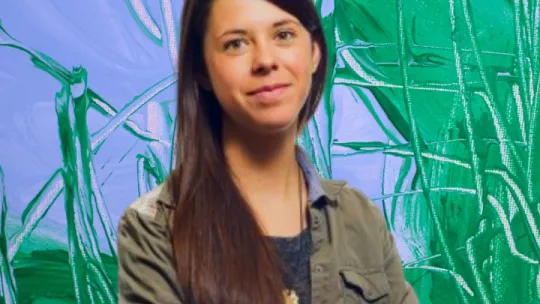Images
Clara Morral is the first author of an article recently published in the scientific journal Cell Stem Cell.
The study identifies that protein synthesis is a key property for the regenerative potential of colon cancer cells.
Clara Morral (Olesa de Montserrat, 1989) is a postdoctoral researcher in IRB Barcelona’s Colorectal Cancer Laboratory. After obtaining her BSc in Biomedicine from the University of Barcelona, she moved to Cambridge, where she joined Matthew Freeman's group in the Laboratory of Molecular Biology (LMB). There, she studied the role of the microenvironment during tumour development and metastasis using Drosophila as an animal model. In 2012, she obtained a fellowship from “La Caixa” to do a doctorate at IRB Barcelona in the Colorectal Cancer Laboratory, headed by Eduard Batlle. She was awarded her doctorate in 2017 and has since continued in the same lab as a postdoc.
She is the first author of the article Zonation of ribosomal DNA transcription defines a stem cell hierarchy in colorectal cancer, which has just been published in the scientific journal Cell Stem Cell. The study focuses on understanding the biological properties of tumour stem cells that confer them the regenerative capacity to maintain limitless tumour growth regardless of their cellular identity. This study involved the use of organoids derived from primary colon cancer tumours of patients, and the extensive utilization of the CRISPR-Cas9 genome editing technique.
1- What was it like finding out that your work was going to be published in Cell Stem Cell? Do you think this paper will make a difference to your career?
It wasn’t news that came out of the blue, we’d been working towards this for a long time. You see that you get a little closer with each day that passes, but one day you get that email telling you that the paper has officially been accepted and... My first reaction was one of satisfaction, and I was quite proud. In the end, you feel like the work was worth it, and it's like a good reward.
I think so. I think it will make a difference. First, because I think it’s a good way through which our lab work can reach the scientific community. Publishing in a high-impact journal helps get your work out into a wider community. This is something that interests me a lot, because I think people should know about our discoveries and should acknowledge us for what we’ve done. And I also think it will help me a lot in the sense that scientific publications are highly valued when applying for funding, and are necessary to advance in the field of academia, so I hope this article helps me both ways.
2- You have used the CRISPR-Cas9 genome editing tool extensively. Can you explain why it is considered such a great step in science? What difference has it made in your experiments?
I think this technique has transformed science in many ways. The fact that it can be used to modify the genome of cells has made it very powerful. It has allowed us to carry out many experiments that were previously not possible with the tools we had. For example, with this technique, we have been able to mark some specific tumour populations that we were unable to label previously, and we have studied them in vivo, that is, to see how they behave within the tumour. And this is really important because you see how they interact with other cells, how they behave, whether they help the tumour grow or not.
Another example is that this technique has allowed us to do what we call depleting (eliminating) specific cells within the tumour. Using this approach, you can corroborate how important these cells are at the moment you eliminate them and see what happens to tumours. In our case, I think these are two aspects that were key to allowing us to draw the conclusions made in the study, and without this technique we would definitely not have been able to do this.
3- How do you think CRC research has advanced in recent years? What are the next challenges?
That's a hard question. A lot of progress has been made in recent years in the general study of cancer and especially colon cancer. Sometimes I get the feeling that everything is moving very fast and that I don't have time to catch up. One area in which most progress has been made in colon cancer regards new mass sequencing and molecular biology technologies. We have been able to unravel what these tumours are like, for example, at the mutational level. This has led us to understand that not all tumours are the same, that not all patients have the same types of tumours, so this facilitates the classification of patients within colon cancer and an understanding of why some therapies work and others don’t, which allows administration of the so-called "targeted therapies".
Progress has also been made in the early diagnosis of colon cancer, from which many techniques have been developed. But one of the challenges of colon cancer continues to be the treatment of metastases, and that's where a lot of the research effort is being channelled right now. For example, we still do not understand why patients who, after having been cured of a primary colon cancer tumour, relapse after many years, developing metastases.
We don’t understand what these cells that remain in the body are like, how they are able to survive so many years and then even reactivate and grow again. This describes the process of metastasis, and in colon cancer we still don’t understand how it happens. And we don't even have effective treatments to treat these metastases. And I think this is where the research effort is being focused. In this regard, I believe that immunotherapy, which is proving to be a very powerful therapeutic tool for some types of cancer such as melanoma, will also gain relevance. Although immunotherapy doesn’t work yet in colon cancer, both in our laboratory and in many others, we have seen that the immune system plays a fundamental role in the development of the disease. We just need to find a way to modulate it so that immunotherapies can also work in colon cancer. I think the direction is this one: metastasis, dormant cells, and especially immunotherapy studies.
4- What led you to join IRB Barcelona? What has your experience been like?
I finished my degree and spent a year in England doing an internship in a laboratory. I think I realized there that I wanted to continue in research and in the world of academia, and I began to think that doing a PhD was the best option. So I informed myself, and I saw that IRB Barcelona had some very good scientists, and research groups that did spectacular work. In fact, my biggest difficulty was deciding which groups I wanted an interview with, as I considered that the science that was being done was very good and I can now corroborate that.
I decided to join IRB Barcelona for this reason. After all the years spent here I have realized that not only is good science done, but a key feature of IRB Barcelona for me is the good atmosphere, especially the community of doctoral students. The environmental is vital as we spend so many hours in it and our work requires so much dedication. For me, it has been really important that the people around me were not just coworkers but good friends. And I think that the Institute fosters community engagement. And one thing feeds the other. If you are happy in your environment, you are also happy doing your job. So I would definitely do it all again if I had the chance!
5- Tell us about your experience as a fundraising partner for the #MetastasisChallenge at IRB Barcelona.
The experience of participating in the Metastasis Challenge was surprisingly very good. I have to admit that I am one of those people who locks themselves in the laboratory and until now I thought that my only way to contribute to society in cancer research was to spend hours and hours there. The Metastasis Challenge made me realize that there are other ways we can collaborate. And this was also very important for me because it allowed me to involve my family and my friends.
It was something that I didn’t do alone because my family helped me. We organized a home wine tasting session. Many friends who I didn’t expect to get involved came. People I didn’t know also came. It was also a day on which I was able to explain to people beyond the scientific world what we do at IRB Barcelona. Then I realized that both sides are very necessary. And until now perhaps I was not so aware of it. The truth is that it was a fantastic day and I think that IRB Barcelona’s Metastasis Challenge campaign is a really good initiative.
About IRB Barcelona
The Institute for Research in Biomedicine (IRB Barcelona) pursues a society free of disease. To this end, it conducts multidisciplinary research of excellence to cure cancer and other diseases linked to ageing. It establishes technology transfer agreements with the pharmaceutical industry and major hospitals to bring research results closer to society, and organises a range of science outreach activities to engage the public in an open dialogue. IRB Barcelona is an international centre that hosts 400 researchers and more than 30 nationalities. Recognised as a Severo Ochoa Centre of Excellence since 2011, IRB Barcelona is a CERCA centre and member of the Barcelona Institute of Science and Technology (BIST).



